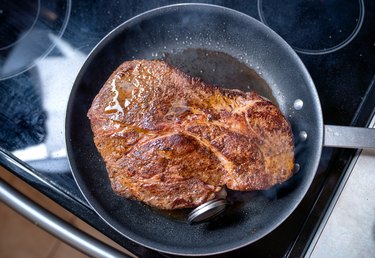
Although meat enthusiasts might prefer a proper rare steak from a top-quality restaurant, most budgets don't allow you to eat this way often. Although you will find a difference between rump roast and chuck roast, these cheaper cuts can both produce tasty and tender meat when properly cooked.
Read more: 5 Healthy Red Meat Recipes That Satisfy
Video of the Day
Video of the Day
Rump Roast vs. Chuck Roast
According to a January 2016 review on beef cuts from Appetite, cut is, on average, the most important characteristic for consumers when shopping for meat. You can find budget-friendly cuts that offer savoriness and tenderness. These cuts include rump and chuck roast.
Meat connoisseurs might notice a difference between rump roast and chuck roast. But anyone with non-discerning taste buds will find that when you use the right cooking method, both cuts offer flavorful, delicate meat. As an added bonus, you will need no knife as the meat will become tender enough to slice with a fork.
The following show the diversities of the rump roast and chuck roast:
- Part of the animal: The rump comes from the cow's hindquarters.
The chuck comes from the shoulder portion of the cow, per the American Angus Association.
- Nicknames: The rump is often known as the beef round roast, and
the chuck is often called the chuck blade roast, chuck arm roast and cross rib
pot roast, according to the Institute of Agriculture and Natural Resources at the University of Nebraska–Lincoln.
- Tenderness: According to the USDA Food Safety and Inspection Service (USDA FSIS), rump and chuck roasts are
generally
less tender. Because both of these animal proteins come from heavily exercised parts
of the cow, they contain copious amounts of collagen and connective tissue that
make the meat tough. Of the two roasts, however, the rump roast is
slightly more tender than the chuck roast.
- Nutritional information: Rump roast is one of only five cuts of
beef that earned the designation of extra lean. Per the USDA,
a 3-ounce (85 grams) round bottom cut trimmed to one-eighth inch of fat contains 152 calories, less than 2 grams of total saturated fat and 23.4
grams of fat.
Chuck roast is one of 29 cuts of beef designated as lean by the USDA, with one 4-ounce (112 grams) serving containing 280 calories, 9 grams of total saturated fat and 19 grams of protein. All beef provides a healthy dose of protein, zinc, vitamins B6 and B12, niacin, iron and riboflavin.
Cooking the Two Roasts
The key to making these tough roasts palatable is a prolonged cooking time over relatively low heat, which allows the connective tissues that make them tough to dissolve. Looking at the cooking methods of the bottom round roast versus chuck roast, both lend well to braising, either on the stovetop, roaster oven or slow cooker:
Braising, according to the USDA FSIS, is roasting or simmering the meat with a small amount of liquid in a covered pan or pot. You can use your favorite type of wine, broth or juice to braise and flavor the meat.
The USDA FSIS suggests braising round or rump roast at 325 degrees Fahrenheit for 30 to 35 minutes per pound. Chuck roast should be braised at the same temperature. You can also oven roast a rump roast as long as you cook the meat low and slow, and cut the resulting roast into thin slices.
When braising a chuck or rump roast, the beef comes out well done.
You should always cook the cut to 145 F, the minimum internal temperature recommended by the USDA FSIS, which ensures the meat remains as tender as possible.
Once you've mastered the meat-cooking process, you can create additional side dishes. Potential options include this LIVESTRONG.com recipe for Farro With Charred Vegetables, providing healthy fiber and greens to your meal, or our simple Broccoli Salad for a crunchy complementary texture to the tender meat.
- USDA FoodData Central: “Chuck Roast”
- USDA FoodData Central: “Beef, Round, Bottom Round, Roast, Separable Lean Only, Trimmed to 1/8" Fat, Choice, Cooked, Roasted”
- University of Nebraska–Lincoln: Institute of Agriculture and Natural Resources: “Animal Science”
- USDA Food Safety and Inspection Service: "Safe Minimum Internal Temperature Chart"
- USDA Food Safety and Inspection Service: "Beef from Farm to Table"
- Appetite: "Using the Animal to the Last Bit: Consumer Preferences for Different Beef Cuts"
- American Angus Association: "Angus Beef Chart"